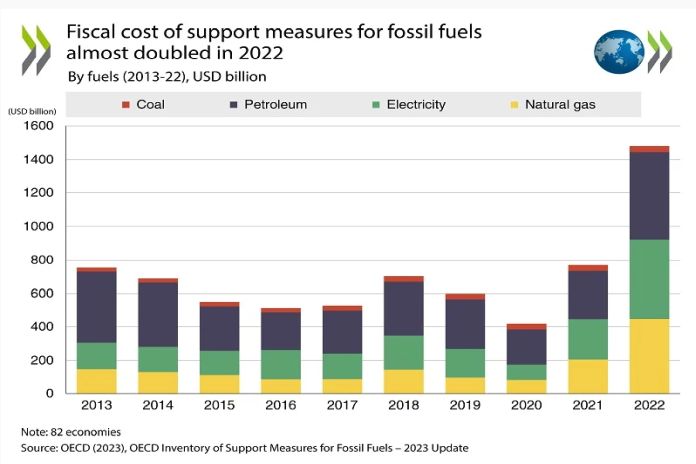PARIS, France – The cost of support measures for the production and consumption of fossil fuels increased sharply in 2022, as countries sought to cushion the impact of surging energy prices on households and firms, according to analysis released today by the OECD and IEA.
New OECD and IEA data show that the fiscal cost of global support for fossil fuels in 82 economies almost doubled to USD 1, 481.3 billion in 2022, up from USD 769.5 billion in 2021, as governments instituted measures to offset exceptionally high energy prices, driven in part by Russia’s war of aggression against Ukraine.
The OECD inventory of support measures for fossil fuels estimates that direct transfers and tax expenditures associated with support measures for fossil fuels amounted to USD 427.9 billion in 2022. In addition, the IEA calculates that fossil fuels sold below market prices amounted to USD 1, 126.6 billion. Increases were significant across petroleum, electricity and natural gas.
For the countries covered by the OECD inventory, support remains mostly directed at consumers (firms and households), representing 81 percent of the total fiscal cost of support measures, followed by support to fossil fuels producers at 16 percent. Support to general services (that is, support which is not targeted specifically at either producers or consumers) represented three percent of the total fiscal cost of support.
The OECD and IEA produce complementary databases that provide estimates of different forms of government support for fossil fuels. The current OECD-IEA combined estimates cover 82 major economies, spanning the OECD, G20 and 33 other major energy-producing and consuming economies representing around 85 percent of the world’s total energy supply.
The IEA tracks fossil fuel subsidies by examining instances where consumer prices are less than the market value of the fuel itself. The IEA finds that consumption subsidies increased to USD 1.1 trillion in 2022, a jump of 116 percent from 2021, driven by the international markets’ price hike.
The analysis also shows a revival of support for coal production and consumption, which reached USD 36.1 billion in 2022 – a 60 percent increase since 2013. These included heating subsidies for households that consume coal and price caps on coal as an input for electricity generation, notably in coal-producing countries and the extension of the lifespan or temporary restart of coal-fired power plants.
Governments need to reform existing support measures to better target those in greatest need. Lack of targeting raises fiscal costs, and tend to disproportionately benefit better-off households, who tend to consume more energy. Finally, more generally, untargeted measures distort price signals, thereby contributing to the continued consumption of fossil fuels.
The OECD and IEA have consistently called for the phasing out of inefficient fossil fuel support and redirection of public funding toward the development of low-carbon alternatives, alongside improvements in energy security and energy efficiency.
Read more. www.oecd.org/fossil-fuels/ and Energy Subsidies – Topics – IEA




